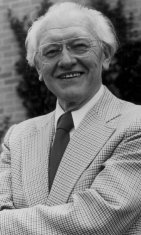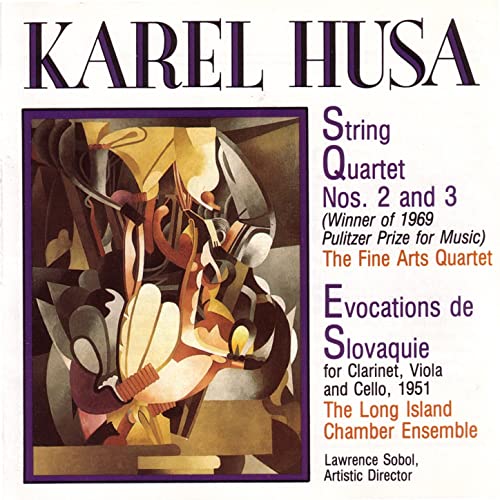
Husa, Karel
Karel Husa
| Born: August 7, 1921 – Prague, Czechoslovakia Died: December 14, 2016 – Apex, North Carolina, USA |
|
| Life | |
| The Czech-born American composer and conductor, Karel Jaroslav Husa, learned to play the violin and the piano in early childhood and, after passing his final examination at high school, he enrolled in the Prague Conservatory in 1941 where he studied in a class of Jaroslav Řídký, and attended courses in conducting led by Metod Doležil and Pavel Dědeček. After the end of World War II, Husa was admitted to the graduate school of the Prague Academy, where he attended courses led by Řídký and graduated in 1947. At the same time, he decided to continue his studies of composition and conducting in Paris. In 1947 he studied with Arthur Honegger and Nadia Boulanger. He studied conducting with Jean Fournet, Eugène Bigot and André Cluytens.
After finishing his courses in conducting at École Normale de Musique de Paris and at Conservatoire de Paris, Karel Husa embarked on a career during which he conducted the world’s leading orchestras and participated in many major projects. He divided his time between composing and conducting, taking an ever more active part in Parisian and international musical life. In 1954 Karel Husa came to the USA and became an American citizen in 1959. In 1954, he was appointed to the faculty of Cornell University where he was Kappa Alpha Professor until his retirement in 1992. He was also lecturer at Ithaca College from 1967 to 1986. Karel Husa conducted many major orchestras including those in Paris, London, Prague, Zurich, Hong Kong, Singapore, New York, Boston, and Washington. Among numerous recordings including his own works, he made the first European disc of Béla Bartók‘s Miraculous Mandarin with the Centi Soli Orchestra in Paris. Every year, Husa visits university campuses to guest-conduct and lecture on his music. He conducted in all 50 American states. Karel Husa was elected Associate Member of the Royal Belgian Academy of Arts and Sciences in 1974 and received honorary degrees of Doctor of Music from several institutions, including Coe College, the Cleveland Institute of Music, Ithaca College, and Baldwin Wallace College. Among numerous honors, Husa received a fellowship from the Guggenheim Foundation; awards from the American Academy of Arts and Letters, UNESCO, and the National Endowment for the Arts; Koussevitzky Foundation commissions; the Czech Academy for the Arts and Sciences Prize; the Czech Medal of Merit, First Class, from President Vaclav Havel; and the Lili Boulanger award. Karel Husa now resides in Apex, North Carolina. He is a National Patron of Delta Omicron, an international professional music fraternity. |
|
| Music | |
| Karl Husa’s First String Quartet marked a big step on the composer’s path to the realm of international music: the Quartet received the 1950 Lili Boulanger Award and the 1951 award at the music festival in Bilthoven in the Netherlands. It has since also been performed on many other occasions, e.g., at the festival of the International Society for Contemporary Music in Brussels (1950), festivals in Salzburg (1950), Darmstadt (1951), and the Netherlands (1952) as well as at various concerts in Germany, France, Sweden, England, Switzerland, Australia and the USA. Other compositions written by Karel Husa during his stay in Paris include Divertimento for String Orchestra, Concertino for Piano and Orchestra, Évocations de Slovaquie, Musique d’amateurs, Portrait for String Orchestra, First Symphony, First Sonata for Piano, and Second String Quartet. Throughout this period, the composer’s underlying preoccupation and interest was style, which was primarily influenced by Vítězslav Novák, Janáček, Béla Bartók and Igor Stravinsky.
His String Quartet No. 3 won the Pulitzer Prize in 1969. Karel Husa is the 1993 recipient of the Grawemeyer Award for Music Composition presented by the University of Louisville for his Concerto for Cello and Orchestra. Husa is probably best known for his Music for Prague 1968, a work in memory of the 1968 Soviet bloc invasion of Czechoslovakia. The work has been performed over 7,000 times worldwide, has become part of the modern repertory. On February 13, 1990, Husa realized a long-time dream when he conducted the orchestral version of Music for Prague 1968 in Prague. Another well-known work of his, Apotheosis of This Earth, is called by Husa a “manifest” against pollution and destruction. Among other works, Husa composed The Trojan Women, a ballet commissioned by the Louisville Ballet and Orchestra; Recollections for Wind Quintet and Piano, commissioned to celebrate the 200th anniversary of friendly relations between the USA and Holland and premiered in October 1982 at the Library of Congress in Washington DC; and Concerto for Wind Ensemble, performed in December 1982 and recipient of the first Sudler prize in 1983. Some of Karel Husa’s more recent works include: Cheetah, premiered in March 2007 by the University of Louisville Wind Symphony in a set of performances that included Carnegie Hall; Les Couleurs Fauves, premiered in 1996 by the Northwestern University Wind Ensemble; Violin Concerto (1993), commissioned for the 150th Anniversary of the New York Philharmonic Orchestra and premiered by concertmaster Glenn Dicterow; String Quartet No. 4 (1991), commissioned for the consortium of Colorado, Alard, and Blair Quartets by the National Endowment for the Arts; Concerto for Orchestra (1986), commissioned by the New York Philharmonic Orchestra and Zubin Mehta; and two works premiered during the 1987-1988 season, Concerto for Organ, commissioned by the Michelson-Morley Centennial Celebration in Cleveland for Karel Paukert, and Concerto for Trumpet and Orchestra, commissioned by the Chicago Symphony Orchestra for Adolph Herseth and Sir Georg Solti. Recent publications include Five Poems for Wind Quintet and Sonatina for Flute and Piano. His music is published by Associated Music Publishers. Recordings of his music have been issued on CBS Masterworks, Vox, Everest, Louisville, CRI, Orion, Grenadilla, and Phoenix USA Recordings, among others. |

